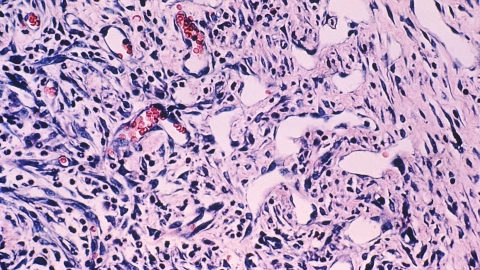ICD-Code C46.2: Kaposi sarcoma of palate
You have cancer.
The tissue in the body is made up of cells. With cancer, the cells multiply uncontrollably, which leads to a malignant neoplasm (abnormal growth of tissue) developing. The cancer cells can destroy the healthy tissue and spread throughout the body.
In your case, the cancer probably consists of cells from lymphatic vessels. Fluid forms in tissue throughout the body every day. This tissue fluid is the lymph. The lymph is carried around the body by lymph vessels. The lymph vessels run around the entire body and are connected to blood vessels. At some points, there are lymph nodes along the lymph vessels. Pathogens are rendered harmless in the lymph nodes, for example.
This cancer is often caused by certain viruses. The cancer can break out if the immune system is severely weakened. The immune system can be weakened through medication or another illness, for example.
The cancer can develop in several places in the body. The cancer you have is in the palate. The palate is the roof of the mouth. The front of the palate consists of a bone plate, the hard palate. At the rear, the palate transitions into the soft palate. At the back of the palate, in the middle, hangs the uvula. To the side of this are the palatine arches.
Not every cancer is the same. There are cancers that develop quickly. You may then quickly feel seriously ill. But there are also cancers that progress slowly. You may then feel generally unwell or weak, or even have no symptoms at all to start with.
Additional indicator
On medical documents, the ICD code is often appended by letters that indicate the diagnostic certainty or the affected side of the body.
- G: Confirmed diagnosis
- V: Tentative diagnosis
- Z: Condition after
- A: Excluded diagnosis
- L: Left
- R: Right
- B: Both sides
Further information
Source
Provided by the non-profit organization “Was hab’ ich?” gemeinnützige GmbH on behalf of the Federal Ministry of Health (BMG).

